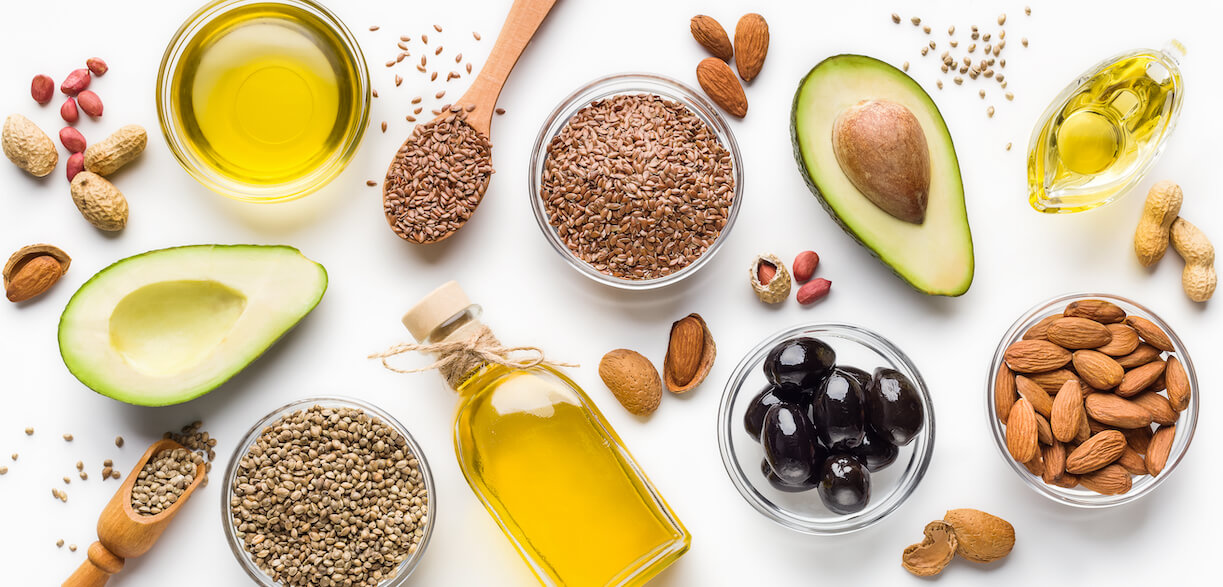Omega 3 is a type of fat, and fats can be categorised by their degree of saturation, which simply refers to how many hydrogen atoms are attached to the molecule.
To make it more simple for you, fats are broken down into three different categories:
- Saturated
- Unsaturated (polyunsaturated and monounsaturated)
- Trans fats
For years past, we have believed – and labelled – saturated fats as ‘bad fats’ and unsaturated as ‘good fats’. Now although it is still recommended to consume the majority of your fat intake through unsaturated fat sources, recent evidence has informed that saturated fats don’t actually contribute to diseases like heart disease and high cholesterol as once thought!
For this post, we’ll solely focus our attention on polyunsaturated fats, and more specifically, Omega 3’s (full name: Omega 3 Fatty Acids). Omega 3 and Omega 6 Fatty Acids are categorised as the most unsaturated type of fat and are classified as ‘essential’ because they cannot be made by body, and have to come through diet alone. So what makes them so good?
One. Omega 3’s are vital for a healthy mind
Did you know that the majority of the brain is made up of fat? To be more specific, it’s actually made up of a type of Omega 3’s! Simply by knowing just this one fact, it makes it a lot easier to comprehend the importance of consuming this nutrient. The role they play in the brain is indispensable: they help with improving memory, and can prevent diseases such as Parkinson’s and Dementia; they also contribute significantly to mood control and maintenance. There has been an incredible discovery lately regarding the link between Omega 3 and mental health issues such as depression and anxiety, finding that those who maintain adequate levels of Omega 3 saw the symptoms and effects of these issues significantly improve. Wow!
Two. Omega 3’s are cardioprotective
A fancy word for a simple meaning – cardioprotective means to protect the heart, especially from heart disease and build-up of plaque in the arteries. Omega 3’s are great for heart health and making sure that those nasties that we ingest from time to time are processed and eliminated as quickly as possible, without sticking around where they shouldn’t!
Three. Omega 3’s reduce inflammation
Inflammation is more often than not the cause for the onset of disease. Reducing inflammation in the body is absolutely essential for maintaining optimal health, and Omega 3’s do a wonderful job at doing just that! Food intolerance and allergies can cause a lot of inflammation in the gut, which can then lead to many issues. Because of this benefit of Omega 3’s, they have been shown to assist in the healthy digestion of many individuals.
Four. Omega 3’s are vital for fertility
Not only do Omega 3’s make up a considerable portion of the brain, they also make up a considerable portion of the retina in the eye, and sperm! Omega 3’s assist in sperm mobility, and uphold the structural integrity of the sperm’s cell membrane; as fertilisation depends on the fat that resides in the cell membrane, ensuring adequate consumption of Omega 3’s becomes increasingly important!
As mentioned earlier, Omega 3’s are very effective at reducing inflammation, and for women, some reproductive issues such as endometriosis can be caused from inflammation. Allowing any inflammation – that you may or may not be aware of – to subside, will be incredibly beneficial for improving fertility.
Where can i find Omega-3’s?
- Oily fish such as salmon, sardines, herring and cod
- Seeds such as chia seeds & flax seeds
- Walnuts
- Soybeans.
(reference: http://www.ncbi.nlm.nih.gov/pmc/articles/PMC3720081/)



